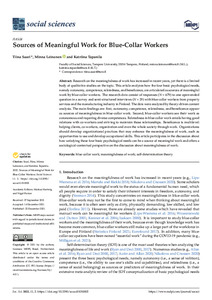Sources of meaningful work for blue-collar workers
Saari, Tiina; Leinonen, Minna; Tapanila, Katriina (2021-12-22)
Saari, Tiina
Leinonen, Minna
Tapanila, Katriina
22.12.2021
2
Julkaisun pysyvä osoite on
https://urn.fi/URN:NBN:fi:tuni-202201101177
https://urn.fi/URN:NBN:fi:tuni-202201101177
Kuvaus
Peer reviewed
Tiivistelmä
Research on the meaningfulness of work has increased in recent years, yet there is a limited body of qualitative studies on the topic. This article analyzes how the four basic psychological needs, namely autonomy, competence, relatedness, and beneficence, are articulated as sources of meaningful work by blue-collar workers. The research data consist of responses (N = 679) to one open-ended question in a survey and semi-structured interviews (N = 29) with blue-collar workers from property services and the manufacturing industry in Finland. The data were analyzed by theory-driven content analysis. The main findings are: first, autonomy, competence, relatedness, and beneficence appear as sources of meaningfulness in blue-collar work. Second, blue-collar workers see their work as autonomous and requiring diverse competences. Relatedness in blue-collar work entails having good relations with co-workers and striving to maintain those relationships. Beneficence is multilevel: helping clients, co-workers, organization and even the whole society through work. Organizations should develop organizational practices that may enhance the meaningfulness of work, such as opportunities to use and develop occupational skills. This article participates in the discussion about how satisfying these four basic psychological needs can be a source of meaningful work and offers a sociological-contextual perspective on the discussion about meaningfulness of work.
Kokoelmat
- TUNICRIS-julkaisut [16983]
